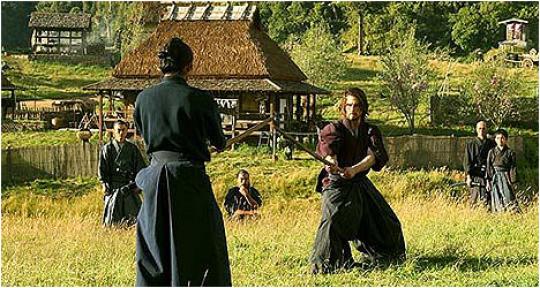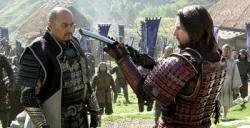The Last Samurai Blu-ray Movie
HomeThe Last Samurai Blu-ray Movie 
Warner Bros. | 2003 | 154 min | Rated R | Nov 14, 2006Movie rating
7.9 | / 10 |
Blu-ray rating
| Users | 4.4 | |
| Reviewer | 3.5 | |
| Overall | 4.3 |
Overview
The Last Samurai (2003)
Set in Japan during the 1870s, The Last Samurai tells the story of Capt. Nathan Algren, a respected American military officer hired by the Emperor of Japan to train the country's first army in the art of modern warfare. As the Emperor attempts to eradicate the ancient Imperial Samurai warriors in preparation for more Westernized and trade-friendly government policies, Algren finds himself unexpectedly impressed and influenced by his encounters with the Samurai, which places him at the center of a struggle between two eras and two worlds, with only his own sense of honor to guide him.
Starring: Tom Cruise, Ken Watanabe, Timothy Spall, Billy Connolly, Tony GoldwynDirector: Edward Zwick
| Action | Uncertain |
| Adventure | Uncertain |
| Epic | Uncertain |
| War | Uncertain |
| Period | Uncertain |
| Martial arts | Uncertain |
| Melodrama | Uncertain |
| Drama | Uncertain |
Specifications
Video
Video codec: VC-1
Video resolution: 1080p
Aspect ratio: 2.40:1
Original aspect ratio: 2.39:1
Audio
English: Dolby Digital 5.1 (640 kbps)
French: Dolby Digital 5.1 (640 kbps)
Spanish: Dolby Digital 2.0 (192 kbps)
Subtitles
English, English SDH, French, Spanish
Discs
50GB Blu-ray Disc
Single disc (1 BD)
Packaging
Slipcover in original pressing
Playback
Region free
Review
Rating summary
| Movie | 3.0 | |
| Video | 4.5 | |
| Audio | 4.0 | |
| Extras | 3.5 | |
| Overall | 3.5 |
The Last Samurai Blu-ray Movie Review
A visually rich BD suffers from superficial storytelling and the Tom Cruise factor.
Reviewed by Greg Maltz March 17, 2008Hailed by some critics as the Gladiator of 2003, The Last Samurai lacks the
authority and emotional impact of the Ridley Scott film. Still, Edward Zwick's epic tale of honor
and integrity in the bushido code is a
good ride. The
costumes, battle
scenes, landscapes, score and camerawork are impressive. Even the acting is relatively strong--
most notably that of Ken Watanabe as samurai leader Katsumodo. But the film
fails
to rise to the sum of its parts. The story was problematic and audiences were not motivated to
care much about the plight of the
main characters. Despite the technically impressive action, Tom Cruise in the role of Nathan
Algren proved a questionable casting choice.
Sent to Japan to help defeat the samurai
and make way for modern trade, Algren
undergoes a complete transformation,
learning the ways of the Japanese villagers. He becomes a samurai warrior and fights for the
preservation of their
culture. Unfortunately, he didn't pull off this reversal convincingly. Where an actor like Russell
Crowe conveys the authority to become a character of
complexity, importance and power, Cruise only conveys the superficial aspects: the facial
expressions, swordplay and earnestness--all of which seem like affectations. Where
Gladiator succeeds because the audience feels an emotional attachment to Maximus,
The Last Samurai fails because no such attachment is forged with Algren.

Nathan Algren (Tom Cruise) adopts the ways of samurai warriors in 19th century Japan.
Tom Cruise should not take all the blame for the film's shortcomings. Zwick is a solid filmmaker, exercising great care with the story, sets and actors. But every plot twist feels too familiar, every slow-motion or close-up shot with violins seems trite and even the epic battle scenes are long in the tooth. Stylistically, Zwick took no chances and in many ways delivered a rehash of more original films made by more gifted directors, e.g., Akira Kurosawa. An even more serious problem was the story itself. Are we to believe that hundreds of years of samurai traditions were ultimately defended by a U.S. Civil War veteran who came to Japan to help fight against the samurai? While many historical aspects of the film are accurate, I have a real problem with the "white male narcissism" factor. If Hollywood wants to explore other cultures and times, can't we get a film that doesn't have Tom Cruise there to teach us about honor and redemption?
This is not the first movie about a disenfranchised American soldier discovering the power of the enemy, respecting their way of life, embracing their customs and finally taking up arms with them in fighting the army he originally joined. Dances with Wolves is a similar story, and both films make good use of the plot device to teach the audience about an alien culture through the eyes of a more familiar character. But the approach plays better in Dances with Wolves for several reasons. The Last Samurai is not as successful in showing the evolution of Algren in accepting the samurai code. It happens in fits and starts, in ways that are not accessible. The fact that Algren was defeated yet not killed, which is the samurai custom, is never explained satisfactorily. Nor is the reason the samurai come to fully respect Algren, whose only reason for being in Japan was to train the Japanese imperial army to exterminate them. Despite these disconnects, the film keeps a good pace and narrative. Technically, there is very little to criticize. The problems amount to chemistry.
The Last Samurai Blu-ray Movie, Video Quality 

The Last
Samurai boasts gorgeous cinematography, landscapes, costumes and lighting. The 2.40:1
1080p VC-1 codec pays it off well. The
video has a few technical issues and may have used noise reduction during some stage of
production, but overall, the detail, colors and contrast are all very good. Depth is quite stunning
on some of the landscape shots and sequences when the Japanese soldiers were lined up for
training. Good detail on the uniforms and backgrounds showed off the textures capable at 1080p.
Dark scenes were good, with gobs of detail, although a touch blotchy in areas where one might
expect shadows.
The picture is the best indicator that Zwick's cinematography decisions are those of a technician
and not an artist. Watch the framing--the choices of what to show and what not to show--and
the camera angles. These videographical decisions appear mechanically flawless, capturing the
characters, landscapes and action beautifully. But something is missing. Instead of artistry and
magic on the screen, the picture seems crafted. Again, it is quite beautiful, with good definition
and adequate depth in 1080p, but the soul seems to be missing, for lack of a better explanation.
Nowhere is this problem clearer than the monochochromatic battle scene shot in the forest. The
blues and blacks appear unnatural and seem like a gimmick.
The Last Samurai Blu-ray Movie, Audio Quality 

The Last Samurai is one of Warner's HD DVD ports that only includes a Dolby Digital 5.1
track. While it is quite good, at 640 kbps, the treble does not seem as extended and the soundstage
doesn't seem as expansive as most lossless PCM tracks. While the sound effects, gunshots and
voices have good tonal characteristics and forwardness, composer Hans Zimmer's orchestral
arrangement was generally shelved further back in the mix. The massed strings did not achieve
good definition, but delivered the liquid midrange that some audiophiles enjoy.
The best
thing that can be said of the DD track was the way it was engineered. Attention to detail and
dynamics are very good. Listen to the scene when the ninja silently invade the sleeping village, and
the ensuing battle with the samurai. The mix of dialogue, sound effects and ambient noises is very
good. Best of all, it is truly immersive, with good use of the surrounds and LFE, which delivers deep,
tight bass in all of the battle scenes. The average HT fan will have no complaints.
The Last Samurai Blu-ray Movie, Special Features and Extras 

With the film's emphasis on costume and set design, the opportunity exists for good bonus
features. In the audio commentary, Zwick comes across as a technician, just as the he did in the
impression one gets from his cinematographic choices. Fans interested in every mechanical detail
of the production will find much data to mine in Zwick's comments. He goes over every aspect of
the film in detail. Of note is Tom Cruise's immense influence, especially in the battle scenes and
editing decisions.
History vs. Hollywood: The Last Samurai is a not-particularly-illuminating documentary
clocking in at over 20 minutes, which originally aired on The History Channel. While most of the
channels documentaries are quite well produced and laden with historical facts, this featurette is
thin in the history department and thick in heaping praise on the film. Again, I have a hard time
buying into the notion that the stewardship of many centuries of samurai customs were
ultimately left in the hands of an American Civil War veteran. Yet there is nothing in the
documentary that adequately addresses this issue.
Edward Zwick: A Director's Video Journal features more than 25 minutes worth of behind
the scenes footage, with commentary by Zwick and Cruise. It will be important to serious fans of
the film only.
Tom Cruise: A Warrior's Journey, clocking in at 12 minutes, shows the costume design
Cruise subjected himself to, especially for the battle scenes. It is the typical costume/make-up
featurette.
Making an Epic: A Conversation with Edward Zwick is a somewhat interesting interview
with the director. On quick scan, it seems to deliver nothing in its 17 minute duration that is not
already discussed in greater detail in the audio commentary.
Imperial Army Basic Training: From Soldier to Samurai offers details on the
mechanics of incorporating extras into the battle scenes. Apparently, significant emphasis was
placed on training so that the scenes conveyed a real sense of military maneuvers.
A World of Detail: Production Design with Lilly Kilvert delivers worthwhile insight into the
building of sets, packed with information in less than five minutes.
Silk and Armor: Costume Design with Ngila Dickson provides a surprising detailed look at
the traditional samurai battlewear. It is both succinct and rewarding.
Rounding out the bonus features are two deleted scenes that aren't worth the five minutes they
last, including optional commentary by Zwick; promotional material from the Japanese film
premieres, and the trailer. Since all the material is ported over from the DVD version, it's in
standard definition.
The Last Samurai Blu-ray Movie, Overall Score and Recommendation 

The Last Samurai is a solid outing by Zwick and company, and an enjoyable Blu-ray that can be recommended with some reservations. It aspires to be a very serious drama, epic in scope. As such, it pitts itself against films that work much better, with stronger character development and direction. By tackling the subjects of Japanese honor and warrior codes, it forces a comparison with works of the legendary Akira Kurosawa, whose skill as a filmmaker is beyond Zwick's reach. At the risk of damning Zwick with faint praise, I have to respect him for doing a relatively good job with the script and lead actor he was given. The film is ambitious and he did it justice. Unfortunately, the technical merits of the production did not translate to heartfelt drama that I could really grab onto and enjoy as a viewer. But if you're looking to add to your collection a Blu-ray title with an epic story, solid picture, immersive surround mix and good battle scenes, I can recommend The Last Samurai.
Other editions
The Last Samurai: Other Editions

The Last Samurai
2003

The Last Samurai
2003

The Last Samurai
2003

The Last Samurai
2003

The Last Samurai
2003

The Last Samurai
Iconic Moments
2003
Similar titles
Similar titles you might also like

Master and Commander: The Far Side of the World 4K
2003

Red Cliff: Part I & Part II
赤壁 / 赤壁:决战天下 | Chi Bi | Original International Version
2008

Kingdom of Heaven 4K
Director's Cut
2005

Flyboys
2006

Band of Brothers
2001

The Patriot
Extended Cut
2000

The Pacific
with Bonus Disc
2010

King Arthur
Director's Cut
2004

Outcast
2014

Red Tails
2012

Saving Private Ryan 4K
Commemorative 20th Anniversary Edition
1998

Special Forces
Forces spéciales
2011

Midway
2019

Troy
Director's Cut
2004

The Warlords
Tau ming chong
2007

Tears of the Sun
2003

Braveheart 4K
1995

Fury 4K
2014

We Were Soldiers 4K
2002

Gladiator 4K
2000
